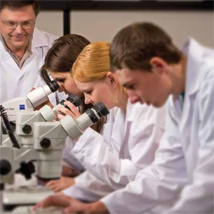Did you eat today? If so, thank the growing industry of agriculture.
From the Fertile Crescent in 10,000 BC to the Palliser Triangle AD 2009, someone, somewhere, somehow has been tilling the soil or tending the herd, practising the science of producing food to feed themselves and others. That industry is alive and well. It is adapting and growing as the world population grows, the climate changes, international trade shifts and consumer tastes evolve.
Regardless of politics, economics, fads and weather, the need for food production remains a constant.
Agriculture is an exciting, vibrant, innovative and adapting industry. Flashy oil booms come and go, but agriculture is here to stay.
“And the future is bright, too,” says Vince Ellert, instructor in the Agricultural Technology program at Lethbridge College. “The industry has remained sustainable. It’s not just about how to produce food; it involves a multitude of ancillary industries. Many students know how to farm, but come to us to learn facets such as marketing, business and communications.”
Not every student entering the program knows Herefords from hayracks, but all can enjoy careers in farm finance, equipment sales and repair, food processing, scientific research, and a host of service and support positions, all of which require insight and understanding to be successful.
Ag students here get their hands dirty in ways potential employers appreciate, while making vital industry connections. Its added value, something not found in textbooks and interminable theory classes.
Here’s how we do it:
The two Tiffin conferences bring to Lethbridge College the movers and shakers of agribusiness, sharing global views on the topics of the day, researched and presented by experts in each field. “Students have the two days to learn from the very best,” says Kathy Waddell, Tiffin Conference co-ordinator. “The connections they make at Tiffin can’t be bought.”
Advisory committees are an integral component of keeping Lethbridge College programs responsive to industry, none more so than in the Ag Tech program. “We’re aware of the diverse aspect of agriculture, and our advisory committee reflects that,” says outgoing chair Frank Walton. “The support we receive in scholarships reflects on the quality of our school.
The agriculture industry in southern Alberta understands the need for skilled employees in every facet of the business, from primary production to all the support services.”
Lethbridge College collaborates closely with numerous producers and agencies who show students first hand what they do and how they do it. “These are not artificial scenarios,” says Waddell. “Students work actual shifts in a hands-on setting and every operation is different. Students won’t find opportunities as diverse as those offered at Lethbridge College. Plus, students develop job contacts and create links through networking. Our programs provide the knowledge and practical skills to be successful in this industry.”
Students who successfully complete a diploma in Agricultural Technology can move to degree studies at the universities of Lethbridge, Alberta or Saskatchewan. If they choose further education, they’ll enter those programs already versed in much of the hands-on training required of competent practitioners, thanks to the intimate class settings at Lethbridge College, taught by faculty with theoretical and practical knowledge of agriculture who keep current with the exciting developments taking place in this sustainable industry.
College wows Texan
Tyler Stephens has a doctorate from a fancy American university, but the Texan believes post-secondary education should begin at the college level.
With a PhD in food safety from Texas Tech in Lubbock, Stephens came to Alberta to collaborate on a project at the Lethbridge Research Centre. When he required a little more knowledge on cellular molecular technology, he took the program offered at Lethbridge College. That led to a meeting with Tom Graham, the program instructor, and an introduction to Graham’s cougar DNA study.
It also introduced Stephens, from San Antonio, to the eye-popping range of goodies in the Cousins Science Centre .
“I was shocked by the facilities you have here,” he says. “Lethbridge College is well set up from the standpoint of both teacher and student. I would encourage any student to start their education at a college. Heading straight to a university from high school is a waste of money, unless you’re entering a specific field such as law or medicine. Here, you get to interact with instructors. These students are getting a lot of hands-on training, which is vital in biology.”
They’re also getting involved in research projects, such as the DNA study.
“I’d say Lethbridge College is involved in more research than community colleges in the United States,” says Stephens. “You’ve got a guy like Tom Graham, who’s a great asset for your biotechnology program and who has connections at the provincial and federal levels and is not afraid to ask questions. He’s a diverse guy; it’s rare to have someone teaching at a college at the point he’s at in his career.”
Stephens had little idea he’d be hunting cougar DNA when he signed up for the program. At the Lethbridge Research Centre, he was conducting work on food safety research, primarily in feed lots.
Coming to Lethbridge made sense: the area has the second-highest concentration of cattle in North America at some one million head within 100 kilometres of the city. (Although, its claims pale before those of Lubbock, the world cow capital at five million within 160 km.)
“Cougar DNA was a new direction for me,” he says. “It’s population genetics: ensuring there’s no inbreeding among cougars in southern Alberta. If there isn’t enough genetic diversity, they won’t be as immune to disease and they’re more likely to become extinct. That’s a major issue because they’re a major predator ecologically and it’s important to keep them healthy for things such as deer control.”


